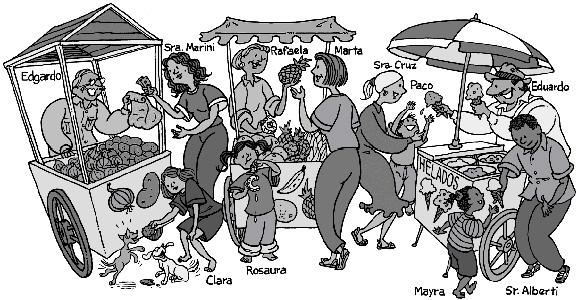En el mercado. Todos los vecinos de la calle Juárez van de compras los sábados. Contesta las preguntas a continuación sobre lo que pasa en el dibujo. Debes usar dos (2) complementos pronominales -un complemento indirecto y un complemento directo- en tus respuestas.  ¿Quién le vende a la Sra. Marini unas papas? Edgardo ____________________ ____________________ vende.
¿Quién le vende a la Sra. Marini unas papas? Edgardo ____________________ ____________________ vende.
Fill in the blank(s) with the appropriate word(s).
Suggestion: Award one-and-a-half points for the correct indirect and direct object respectively.
You might also like to view...
In 1925, a schoolteacher named John T. Scopes taught evolution in Dayton, Tennessee. The local authorities indicted Scopes, and his case came to trial. William Jennings Bryan agreed to help prosecute Scopes, and the American Civil Liberties Union brought in the noted trial lawyer Clarence Darrow for the defense. The proceedings attracted national attention and the trial became a media circus. The
judge refused to let Darrow call in scientists to defend evolution. Darrow summoned Bryan as an expert witness on the Bible. The two men sparred for several days. Bryan defended the literal interpretation of the Bible, but to the reporters covering the trial he seemed to wither under Darrow's cross-examination. Sophisticated Americans regarded Bryan as a joke, but in rural America he remained a hero. The jury found Scopes guilty and assessed him a small fine. Bryan died shortly after the trial. To many Americans, the Scopes trial seemed to signal the end of fundamentalism, and the political side of the movement did lose momentum during the late 1920s. But during the same period fundamentalism returned to its roots. It concentrated on creating a network of churches, schools, and colleges where its doctrines could be taught to future generations. The forces underlying fundamentalism during the 1920s would remain a potent element in American culture. The author's main purpose is to a. discuss the Scopes trial and the results of the verdict. b. praise Bryan for defending the Bible. c. argue that teachers should not teach evolution. d. argue that teachers should be allowed freedom of expression.
¿Adónde va Esmeralda con su amiga Yolanda? ¿Cómo es este lugar y qué representa?
What will be an ideal response?
Ana: Mi cámara web no funciona y no puedo verte.Carlos: Estás (furiosa / enferma), ¿no? Acabas de comprar esta cámara web.
A. furiosa B. enferma
What is the tone of this poem? What strategies, diction, syntax, or language does Wordsworth use to convey this tone?
What will be an ideal response?